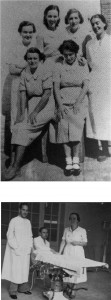Remembering Margaret Powell
This article appeared in the 36th issue of the newsletter of the International Brigade Memorial Trust and is reprinted here with the IBMT’s permission.

NURSES: Top, back row, left to right: Margaret Powell, Susan Sutor, Anne Mur-ray and Patience Darton; seated: Agnes Hodgson and Mary Slater, at Poleniño Hos-pital, Aragon, in 1937. Bottom: Margaret Powell in Barcelona Hospital No.7 in 1938 with Dr Gonzalo Aguiló Mercader (left) and unidentified other person.
Lily Margaret Powell was born in March 1913, one of nine children, at Cwm Farm, Llangenny, where her father farmed a small Welsh hill farm. She attended the village school, leaving home aged 16 to train as a nurse, first in Essex, later in London at St Giles’, Camberwell, and St Olave’s, Rotherhithe – areas as hard hit by the depression of the 1930s as was South Wales.
When Franco and his cohorts rebelled against the elected Republican Spanish government in 1936 Margaret was advised to finish her midwifery training before volunteering. She was accepted by the Spanish Medical Aid Committee and left for Spain in mid-1937.
Front-line
She was a front-line nurse in Aragon during the bitter battles of the terrible winter of 1937-38 when the wounded often froze to death before they could receive medical attention. Life-saving medication was in short supply and Margaret found herself, aged 25, having to “triage” the wounded as they arrived from the front – deciding who could be saved. Major surgery was carried out without anesthetics, the dark only redeemed by using cigarette lighters.
Often the team of nurses, a Spanish doctor and village girls rapidly trained as nurse-aides, had to move at a moment’s notice, setting up operating theatres in barns, stables, a disused slaughter-house and once a ruined medieval castle in Montclar, Catalonia.
Margaret assisted in thousand of operations, often working 72 hours or more at a stretch as the wounded poured in from an offensive. She was proud that during this time the team didn’t lose a man to post-operative septicemia – or a single piece of the precious surgical equipment sent from Britain.
During the occasional lulls in the fighting the team helped village people in Aragon who had never in their lives seen a doctor, giving ante- and post-natal care and minor surgeries where necessary.
Later, transferred to Barcelona, she worked in several hospitals, even as Franco’s forces closed in and bombs fell. In February 1939 Margaret and part of the team retreated into France where she was promptly imprisoned with other Spanish refugees in beach enclosures without any facilities. She was rescued after more than three weeks by a team of Quakers who’d been alerted to her plight.
Although she started work again in England after a few months, it was only in 1944 that she went abroad again, this time to upper Egypt to care for Yugoslav partisans’ families in the UNRRA (United Nations Relief and Rehabilitation Administration) El Shatt desert camp.
Once the families returned home in 1946, she transferred to the American zone of Germany, working in the displaced persons camps of Amberg and Coburg. It was here that she encountered Jewish teenagers – survivors of the concentration camps – a number of whom committed suicide. These memories, combined with her experiences in Spain, were to haunt her for the rest of her life.
Poorest areas
After 1948, she worked as a health visitor in some of the poorest areas of north London, married International Brigader Sam Lesser, became a mother, spent three years in the USSR and worked at the City of London Polytechnic.
In 1976 Margaret was made a “Dame” of the Orden de la Lealtad a la República Española by the Spanish government in exile. She died in November 1990, aged 77.
Ruth Muller is the daughter of Margaret Powell and Sam Lesser.













[…] Más información en: https://albavolunteer.org/2014/03/remembering-margaret-powell/ […]